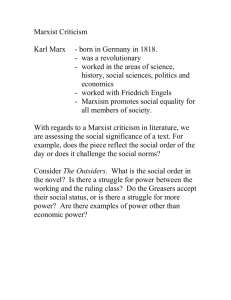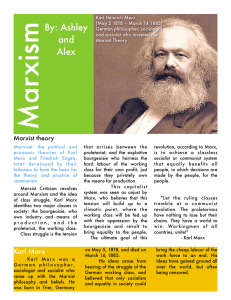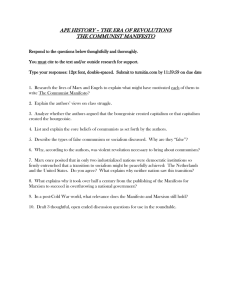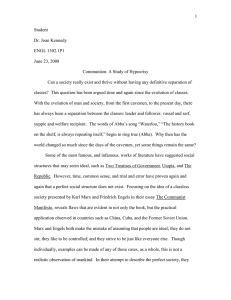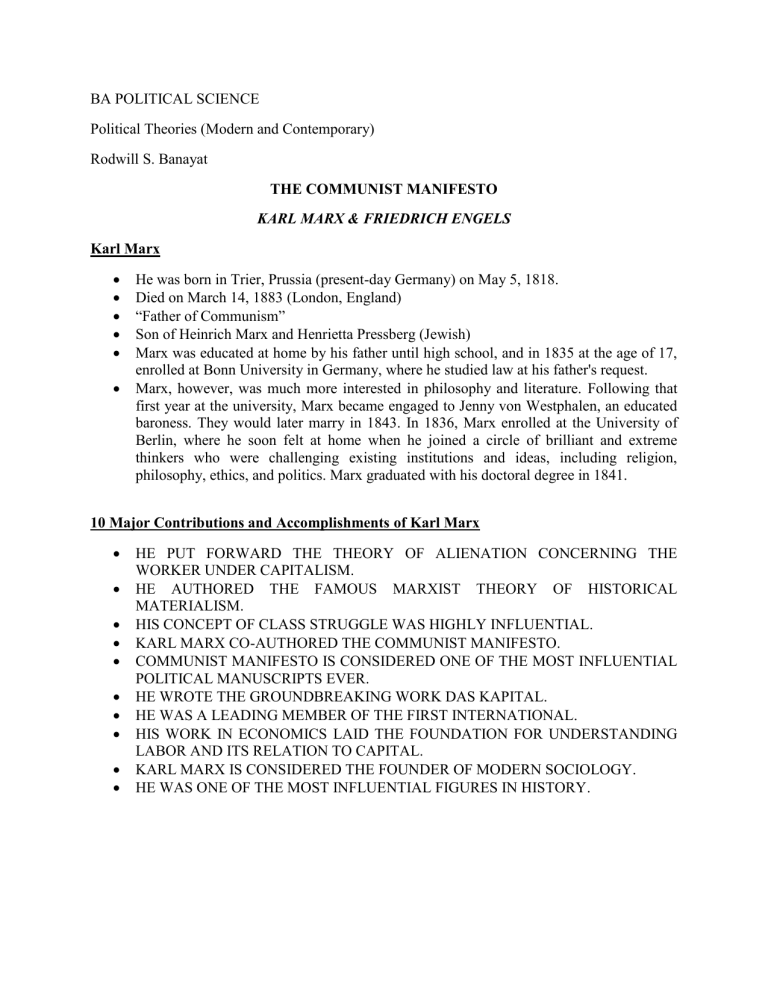
BA POLITICAL SCIENCE Political Theories (Modern and Contemporary) Rodwill S. Banayat THE COMMUNIST MANIFESTO KARL MARX & FRIEDRICH ENGELS Karl Marx He was born in Trier, Prussia (present-day Germany) on May 5, 1818. Died on March 14, 1883 (London, England) “Father of Communism” Son of Heinrich Marx and Henrietta Pressberg (Jewish) Marx was educated at home by his father until high school, and in 1835 at the age of 17, enrolled at Bonn University in Germany, where he studied law at his father's request. Marx, however, was much more interested in philosophy and literature. Following that first year at the university, Marx became engaged to Jenny von Westphalen, an educated baroness. They would later marry in 1843. In 1836, Marx enrolled at the University of Berlin, where he soon felt at home when he joined a circle of brilliant and extreme thinkers who were challenging existing institutions and ideas, including religion, philosophy, ethics, and politics. Marx graduated with his doctoral degree in 1841. 10 Major Contributions and Accomplishments of Karl Marx HE PUT FORWARD THE THEORY OF ALIENATION CONCERNING THE WORKER UNDER CAPITALISM. HE AUTHORED THE FAMOUS MARXIST THEORY OF HISTORICAL MATERIALISM. HIS CONCEPT OF CLASS STRUGGLE WAS HIGHLY INFLUENTIAL. KARL MARX CO-AUTHORED THE COMMUNIST MANIFESTO. COMMUNIST MANIFESTO IS CONSIDERED ONE OF THE MOST INFLUENTIAL POLITICAL MANUSCRIPTS EVER. HE WROTE THE GROUNDBREAKING WORK DAS KAPITAL. HE WAS A LEADING MEMBER OF THE FIRST INTERNATIONAL. HIS WORK IN ECONOMICS LAID THE FOUNDATION FOR UNDERSTANDING LABOR AND ITS RELATION TO CAPITAL. KARL MARX IS CONSIDERED THE FOUNDER OF MODERN SOCIOLOGY. HE WAS ONE OF THE MOST INFLUENTIAL FIGURES IN HISTORY. Friedrich Engels Friedrich Engels was born on 28 November 1820, in Barmen, in what is now Germany but was at the time governed by the Kingdom of Prussia. His father, also called Friedrich, was a wealthy factory owner and expected his son to join the family business. Engels took his first steps in journalism while also working in an export office in Bremen. He wrote under a pseudonym so that his radical articles did not embarrass his family. Engels embarked on a year’s voluntary military service in 1841 with an artillery regiment based in Berlin. In 1842, Engels became a communist. On his way to England in November 1942, Friedrich Engels met Karl Marx, with whom he would develop a lifelong collaboration based on their mutual views on socialism. In 1845, Engels published The Condition of the English Working Classes, a study of the state of the working poor in Salford and Manchester that became hugely influential. Engels and Marx produced their Communist Manifesto in 1848, which set out the principles and policies of communism. During 1848, the Year of Revolutions, Engels and Marx used their writings to try and influence the revolution in the German states as it tried to institute a constitutional government. Friedrich Engels died of cancer in London in 1895, aged 74. Development of History Stages of History and Class Conflict at Each Stage Primitive Communism – Equalitarian hunting and gathering or tribal organizations. Slavery – Largely agricultural production done by slaves for slave owner. Feudalism – Largely agricultural production done by serfs, slaves for large land owners. Capitalism – Economic dominance based on ownership of factories, capital, land, business, Class Struggle between owners (bourgeoisie) and workers. Socialism – Government make some decisions. 1. Materialist Dialectics (View of the World as a Whole) - Dialectical Materialism is a way of understanding reality; whether thoughts, emotions, or the material world. Simply stated, this methodology is the combination of Dialectics and Materialism. The materialist dialectic is the theoretical foundation of Marxism (while being communist is the practice of Marxism). 2. Historical Dialectical Materialism (View of Human Society) - The structure of society and its historical development are determined by "the material conditions of life" or "the mode of production of the material means of existence. 3. Structural Marxism - Is an approach to Marxist philosophy based on structuralism, primarily associated with the work of the French philosopher Louis Althusser and his students. It was influential in France during the 1960s and 1970s, and also came to influence philosophers, political theorists and sociologists outside France during the 1970s. Other proponents of structural Marxism were the sociologist Nicos Poulantzas and the anthropologist Maurice Godelier. Many of Althusser's students broke with structural Marxism in the late 1960s and 1970s. 4. Humanist Marxism - Marxist humanism is an investigation into "what human nature consists of and what sort of society would be most conductive to human thriving"[2] from a critical perspective rooted in Marxist philosophy. Marxist humanists argue that Marx himself was concerned with investigating similar questions. Marxist Three Levels of Culture Mod *Adaptive – A culture could be called adaptive it encourages confidence and risk taking amongst employee, possesses a leadership that produces change, and focuses on the changing needs of customers. *Ideational - An ideational culture is the opposite of a sensate culture. An ideational culture, also called a spiritual culture, is one that is based on what cannot be seen but can be felt. 1. Infrastructure: Population, basic biological need, and resources. 2. Structure: Pattern of organization 3. Superstructure: Social institution The Communist Manifesto has four sections. In the first section, it discusses the Communists' theory of history and the relationship between proletarians and bourgeoisie. The second section explains the relationship between the Communists and the proletarians. The third section addresses the Socialist and Communist Literature. The final section discusses the relationship between the Communists and other parties. 1st section: "The history of all hitherto existing society is the history of class struggles." - Freeman and slaves, patrician and plebeian, lord and serf, guild master and journeyman, in a word oppressor and oppressed, stood in constant opposition to another, carried on an uninterrupted, now hidden, now open fight, a fight that each time ended, either in a revolutionary reconstruction of society at large, or in the common ruin of the contending classes. 2nd section: "In place of the old bourgeois society, with its classes and class antagonisms, we shall have an association, in which the free development of each is the condition for the free development of all." – In what relation do the Communists stand to the proletarians as a whole? 3rd section: In the third part of the manifesto, Marx and Engels present an overview of three types of critique against the bourgeoisie. These include reactionary socialism, conservative or bourgeois socialism, and critical-utopian socialism or communism. They explain that the first type either seeks to return to a feudal structure or preserve conditions as they are. This type is actually opposed to the goals of the Communist Party. Conservative or bourgeois socialism stems from members of the bourgeoisie savvy enough to know that one must address some grievances of the proletariat to maintain the system as it is. Marx and Engels note that economists, philanthropists, humanitarians, those who run charities, and many other "dogooders" espouse and produce this particular ideology, which seeks to make minor adjustments to the system rather than change.Finally, critical-utopian socialism or communism offers real critiques of the class and social structure. A vision of what could be, this type of communism suggests that the goal should be to create new and separate societies rather than fight to reform the existing one. It opposes a collective struggle by the proletariat. 4th section: In the "Communist Manifesto's" final section, Marx and Engels point out that the Communist Party supports all revolutionary movements that challenge the existing social and political order. The manifesto ends with a call for the proletariat, or working class, to come together. Invoking their famous rally cry, Marx and Engels say, "Working men of all countries, unite!"
